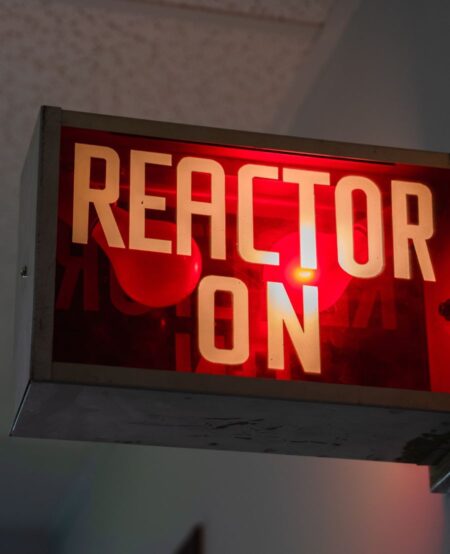
Be part of the future of nuclear in our society
This new, multifaceted minor prepares students to address complex challenges and harness opportunities within the nuclear sector.
Gain diverse insights from experts at Canada’s nuclear university and a comprehensive understanding of nuclear technology’s societal impact and future potential.
Be part of the next generation of nuclear experts.
Interdisciplinary learning
The Minor in Nuclear Studies and Society is open to students from all faculties at McMaster University.

Program requirements
Students will have to complete 24 units (8 courses) to satisfy the requirements for a Minor in Nuclear Studies. This includes:
| 6 units from: | 3 units from: | 15 units from: |
|---|---|---|
| NUCLST 1N03: Nuclear Technology Applications NUCLST 2N03: Nuclear Technology & Society | NUCLST 4N03: Interdisciplinary Topics in Nuclear Studies NUCLST 4NN3: Nuclear Energy in Practice | Course list 1: Nuclear Engineering*, or Course list 2: Nuclear Applications in Applied and Medical Science, or Any combination of Course lists 1, 2, and 3 |
Course lists
A large selection of courses covering a breadth of knowledge is available in the minor.
It is the student’s responsibility to check carefully for prerequisites, co-requisites and enrolment restrictions. Students are strongly encouraged to seek guidance from their Academic Advisor to ensure they are meeting all enrolment requirements, including Faculty-specific requirements.
Please note: not all courses listed are available each year.
- AUTOTECH 3TS3: Fluid Mechanics
- AUTOTECH 3CT3: Control Theory
- BIOTECH 3BC3: Bioprocess Control and Dynamics
- CHEMENG 2O04: Fluid Mechanics
- CHEMENG 3A04: Heat Transfer
- CHEMENG 4A03: Energy Systems Energy
- CHEMENG 4EC3: Electrochemistry and Electrochemical Technologies
- CIVENG 2A03: Surveying and Measurement for Transportation and Construction
- CIVENG 2B04: Principles of Environmental Engineering
- CIVENG 2J03: Engineering Geology
- CIVENG 2O04: Fluid Mechanics
- CIVENG 3G04: Structural Analysis
- CIVENG 3P04: Civil Engineering Materials and Design
- CIVENG 4K04: Modern Methods of Structural Analysis
- CIVTECH 4RC3: Reinforced Concrete and Masonry Design
- CIVTECH 4UM3: Asset Management
- ELECENG 3CL4: Introduction to Control Systems
- ELECENG 3PI4: Energy Conversion
- ELECENG 4PM4: Electrical Power Systems
- ENRTECH 3EP3: Power Systems and Electrical Machines
- ENRTECH 4CT3: Systems and Control
- ENRTECH 3PD3: Power Distribution
- ELECENG 4PP4: Smart and Micro Grids
- ENGPHYS 2NE3: Thermal Systems Design
- ENGPHYS 3D04: Principles of Nuclear Engineering
- ENGPHYS 3L04: Engineering Metrology
- ENGPHYS 3O04: Introduction to Fluid Mechanics and Heat Transfer
- ENGPHYS 4D04: Nuclear Reactor Physics
- ENGPHYS 4NE3: Advanced Nuclear Engineering
- ENGPHYS 4P03: Nuclear Power Plant Systems and Operation
- ENGPHYS 4PP3: Plasma Physics Applications
- GENTECH 3LS3: Quality Control and Assurance Methods
- GENTECH 4LM3: Lean Thinking and Practices
- GENTECH 4OM3: Operations Management
- MANTECH 3LS3: Quality Control and Assurance Methods
- MANTECH 4MM3: Design and Manufacturing of Machine Elements.
- MATLS 2A04: Introduction to Materials Engineering
- MATLS 2B03: Introduction to the Thermodynamics of Materials
- MATLS 3E04: Mass Transfer
- MATLS 3M03: Mechanical Behaviour of Materials
- MATLS 3T04: Phase Transformations
- MATLS 4D03: Corrosion and Its Control
- MATLS 4MS4: Materials Selection in Design and Manufacturing
- MECHENG 2P04: Statics and Mechanics of Materials
- MECHENG 2W04: Thermodynamics
- MECHENG 3C03: Manufacturing Engineering
- MECHENG 3E03: Mechanical Engineering Design Theory
- MECHENG 3O04: Fluid Mechanics
- MECHENG 3R03: Heat Transfer
- MECHENG 4S03: Incompressible Flow
- MECHENG 4U03: Compressible Flow and Turbomachinery
- MECHENG 4V03: Thermo-Fluid Systems Design and Analysis
- PROC TECH 2IC3: Instrumentation &Control
- PROC TECH 4IC3: Industrial Networks and Controllers
- PROCTECH 4CT3: Advanced Control Theory
- SFWRENG 3K04: Software Development
- SFWRENG 3RA3: Software Requirements and Security Considerations
- SFWRTECH 3CS3: Introduction to Cyber Security
- SFWRTECH 4NS3: Advanced Cyber Security
- SFWRTECH 4SS3: Software Security
- CHEM 3RC3: Radioisotopes in Medicine
- EARTHSC 4CC3: Stable Isotopes in Earth and Environmental Systems
- ENVSOCTY 3EC3: Environmental Catastrophes
- MEDPHYS 1A03: Physics in Medicine & Biology
- MEDPHYS 3C03: Operational Health Physics: laboratory and communication
- MEDPHYS 4B03: Radioactivity and Radiation in Medical Physics
- MEDPHYS 4F03: Fundamentals of Health Physics
- MEDPHYS 4RA3: Radiation and Radioisotope Methodology I
- MEDPHYS 4T03: Clinical Applications of Physics in Medicine
- MEDPHYS 4U03: Radiation Biology
- MEDRADSC 2W03: Physics and Instrumentation for Radiation Therapy
- MEDRADSC 2X03: Radiobiology and Protection
- MEDRADSC 2Y03: Radiographic Imaging and Instrumentation I
- MEDRADSC 3B03: Quality Management in Medical Radiation Sciences
- MEDRADSC 3G03: Radiographic Imaging and Instrumentation II
- MEDRADSC 3H03: Quality Control in Radiography
- MEDRADSC 3X03: Research Methods in Medical Radiation Sciences
- MEDRADSC 3Y03: Ethics for Medical Radiation Sciences
- PHYSICS 4E03: Particle and Nuclear Physics
- CHALLENG 2CC3: Critical Challenges for Humanity
- CMTYENGA 2A03 – Foundations of Community Engagement
- ENGLISH 2SL3: Social Justice, Literature and the Rhetoric of Science and Technology
- HISTORY 2GW3: A History of Global War
- HISTORY 3TC3: Science, Technology in World History
- HISTORY 3UA3: The History of the Future
- HISTORY 4JJ3: U.S. Foreign Relations
- PEACJUST 2XX3: Social & Structural Determinants of Health
- PHILOS 2CT3: Critical Thinking
- PHILOS 2D03: Bioethics
- PHILOS 2YY3: Ethics
- PHILOS 3L03: Environmental Philosophy
- PHILOS 3N03: Political Philosophy
- POLSCI 3GC3: Politics of a Dying Planet
- POLSCI 3Q03: The Causes of War
- POLSCI 4SS3: Public Opinion and Policy










